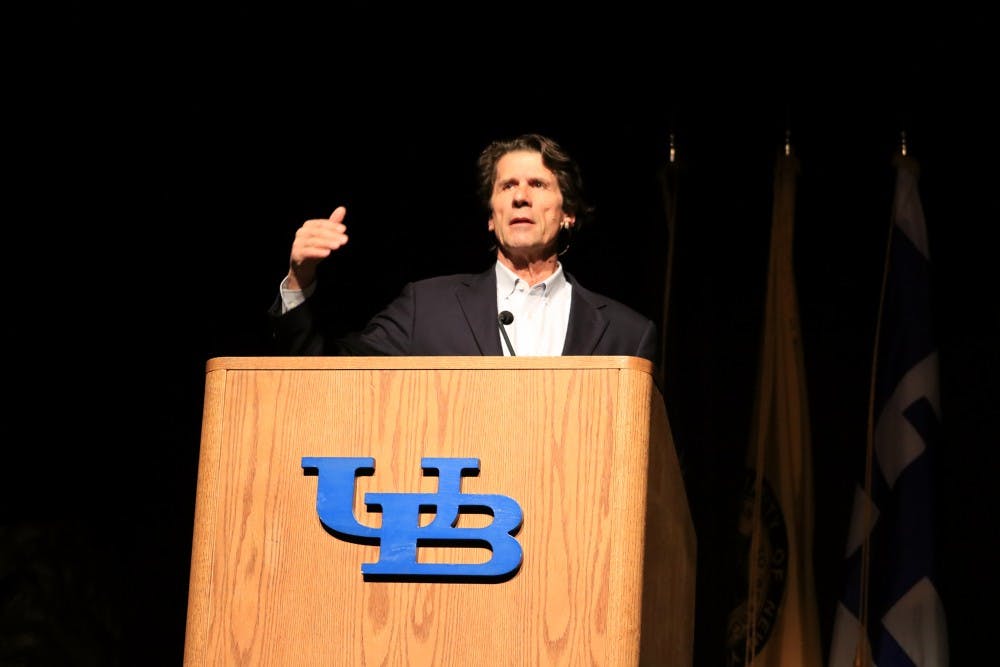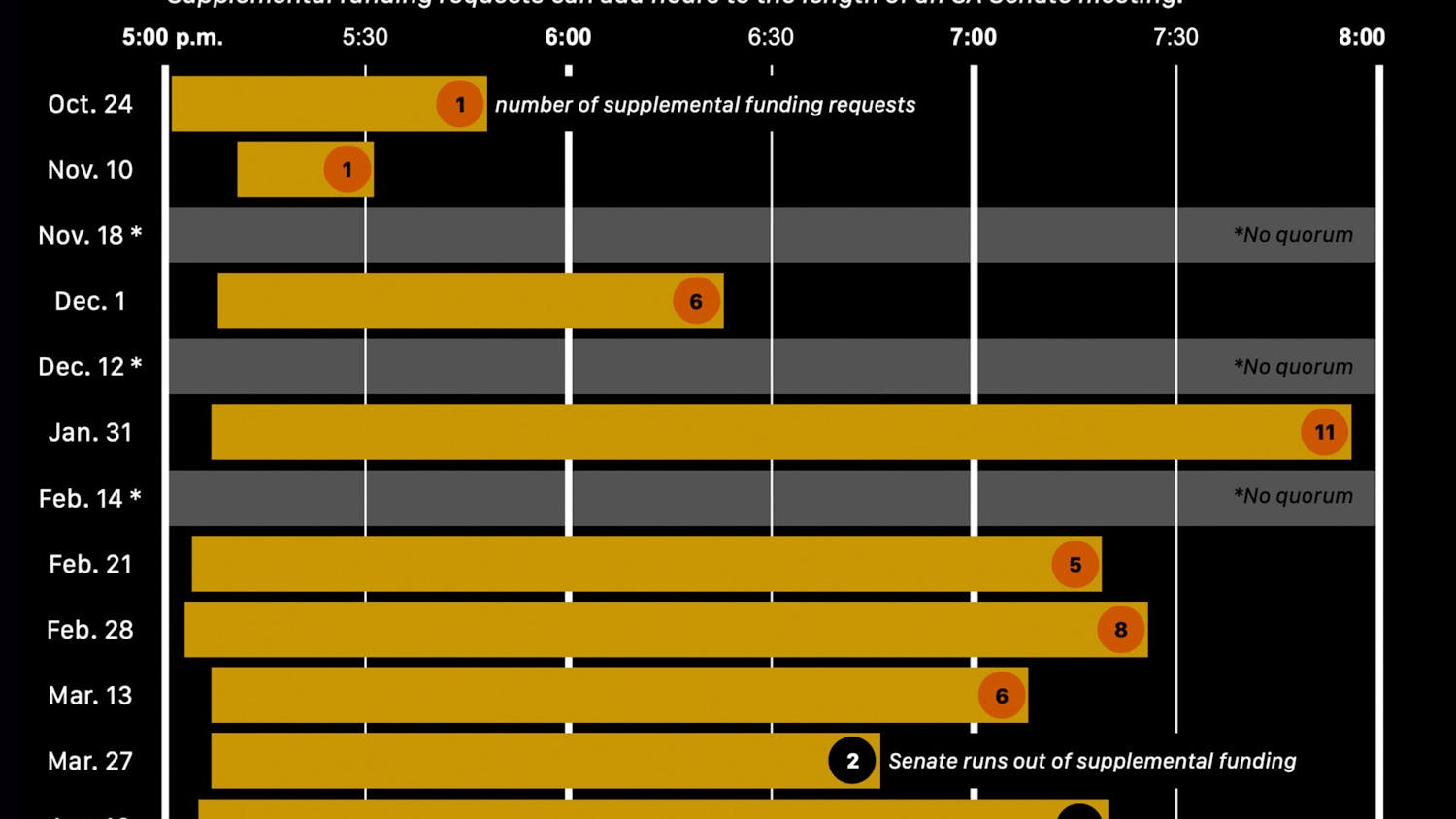James Balog has had several near death experiences.
While he was flying over a 3,000-foot cliff in Greenland and surrounded by icebergs and 29 degree seawater, his helicopter’s engine died. Luckily, the helicopter’s second engine saved his crew, narrowly sending him back to the landing pad, in what he called a “gnarly morning.”
Balog, a global expert on climate change, photographer and founder of the Extreme Ice Survey, shared some of his stories and films and discussed climate change Thursday night at Alumni Arena as part of UB's Distinguished Speaker Series.
Jason Briner, an associate professor in the geology department moderated the event, sponsored by the College of Arts and Sciences.
Balog opened his speech with a quirky video of him dancing in various adventuring outfits, including diving suits, arctic parkas and climbing gear.
“I have to be a chameleon in order to fit myself into the different situations I get myself into,” he said.
He also showed photos and videos of his research, including 10-year time lapses of glaciers nearly disappearing along with clips from his new film, “The Human Element,” which premiered at the San Francisco Film Festival last Saturday.
The film follows Balog and his crew, which captures how people deal with climate change.
“Earth, air, fire and water –– for thousands of years people thought these were the only elements that affected climate change, when there weren’t that many Homo sapiens living on the earth,” Balog said. “But humans are another element. We have this desire for affluence and a lot of powerful technology. But as we change nature, essentially nature is pushing back and changing us.”
Balog showed a clip of firefighters in Colorado battling forest fires in the Rocky Mountains. Climate change has left Colorado extremely dry in recent years, resulting in an increase of wildfires, which nearly burned down Balog's house in 2010.
Balog spoke about what he’s known for best: his powerful, vibrant images of glaciers across the globe.
He also talked about the Extreme Ice Survey –– a project he started in 2007 to place cameras in remote regions of Alaska, Iceland, Greenland and Montana, to film the changing glacier formations. Using 34 time-lapse cameras at 18 glaciers, he produced the award-winning documentary “Chasing Ice,” showcasing the receding glacial formations.
Balog said one of the main reasons why there are so many skeptics of global warming is because not everyone is a scientist. When a scientific paper is published, not everyone will understand what’s being discussed, creating a gap between the science community and thousands of Americans.
“Glaciers are canaries in the global coal mine,” Balog said. “A lot of scientific papers are hard to put into images, but that’s what I’ve been chasing with "The Human Element" and my work with glaciers … there’ve been many cases where after I give a talk and people see my images, they come up and tell me that I’ve changed their perspective on climate change.”
Balog said he is disappointed with the state of the earth’s glacial formations, but finds inspiration in what they leave behind.
“I saw rivers and lakes where just a few years ago a giant glacial formation stood,” Balog said. “I just expected the glaciers to disappear and be left with rocks. I never expected these water features to be left behind.”
Balog feels climate change is a major threat and said people need to stop believing it is made up. He said that science is quantitative and shouldn’t be subject to doubt based on beliefs.
Balog said the melting glaciers are causing sea level rises of an eighth-of-an-inch per year. With more water in our oceans, hurricanes and nor’easters will continue to become increasingly worse each year. In 2017, the 16 largest weather disasters cost Americans $1 billion in damages, according to Balog.
Balog finished his talk on an inspiring note, encouraging the audience to combat climate change in their own way, no matter how small the action. Riding your bike instead of driving, eating less meat and being conscious of water and electricity usage can all benefit the earth, he said.
He applauded the efforts of activists who advocate for divestment, acknowledging UB’s student-run program Fossil Free UB.
Briner also facilitated the final Q&A portion of the night. Community members asked him various questions from his favorite adventure to the artistic style of his photography.
Anthony DeFeo, a junior film studies major and member of UB Fossil Free, participated in the Q&A. He enjoyed Balog’s talk and hopes UB, will bring more environmental activists to campus.
“I think it’s really important that more prominent figures like him come to UB,” DeFeo said. “He made a really great stance for individual activism. You can do your own thing in a small way. If everyone pitches in even just a little bit, it really does add up to make a huge difference.”
Balog is preparing for his next adventure this summer, when he’ll leave for the North Pole on a Russian icebreaker ship.
The final speaker of this year’s 31st annual Distinguished Speaker Series will be Alan Alda, TV icon and science communicator, who will speak on May 2.
Correction: The original article stated, He applauded the efforts of activists who stand up against divestment, acknowledging UB’s student-run program Fossil Free UB.
Max Kalnitz is a news editor and can be reached at max.kalnitz@ubspectrum.com





